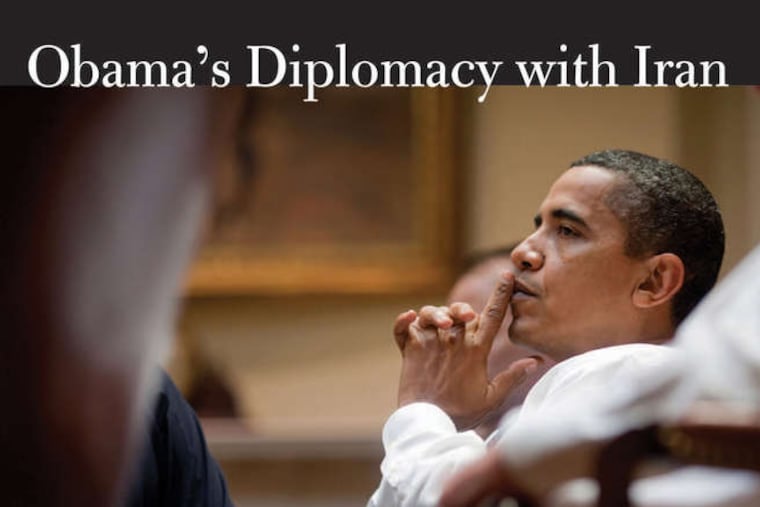A bungled chance at talks with Iran 'without precondition'
In his first campaign for president, Barack Obama promised to break with American policy of three decades and talk directly, "without precondition," to leaders of Iran, a country George W. Bush had shunned as part of an international "axis of evil."

Obama's Diplomacy With Iran
By Trita Parsi
Yale University Press. 284 pp. $27.50
nolead ends nolead begins
Reviewed by Kenneth J. Cooper
In his first campaign for president, Barack Obama promised to break with American policy of three decades and talk directly, "without precondition," to leaders of Iran, a country George W. Bush had shunned as part of an international "axis of evil."
The new administration's diplomats did talk to their Iranian counterparts, in Obama's first year in office, with the high-stakes aim of containing and making more transparent the nuclear program of the Middle Eastern country, which in 1979 rudely introduced the United States to Islamic fundamentalism by seizing the U.S. Embassy in Tehran, capturing 66 Americans, and holding most of them hostage for more than a year.
The unprecedented talks failed. Why they did is the focus of this detailed examination by Trita Parsi, who, as president of the National Iranian American Council, has knowledgeable sources in both countries, as well as Europe. He spreads the blame around widely, from Iran and Israel to Europe and the United States, including the Obama administration, Congress, and the American Israel Public Affairs Committee, an influential Washington lobby. He is not hopeful that a similar diplomatic initiative will occur anytime soon.
This is a book primarily for foreign policy specialists, but deserves a broader audience, given the stream of recent news accounts of Iranian threats to close a vital oil-shipping lane and attack American and Israeli interests, and the possibility that Israel will launch air strikes on the nuclear installations of an archenemy.
The American and United Nations sanctions that Obama's bold policy has devolved into are squeezing Iran, which is proceeding along a path that could enable it to produce nuclear weapons. Tensions in the region are rising and, if it blows up, Americans will certainly feel it, at the gas pump and elsewhere.
Parsi, who was born in Iran but is a Zoroastrian, not a Muslim, makes clear that Obama's Iran policy was not as straightforward as it is commonly understood. It had two simultaneous tracks - talks and sanctions. The theory was that trying for a diplomatic solution would, if it failed, make it easier to build international support for tougher sanctions. On the other hand, the threat of tightening sanctions was expected to pressure Iran to come to the table and reach an agreement quickly.
Such ambiguity often characterizes difficult international relations. Parsi, though, is no fan of Obama's dual-track strategy, declaring that "sanctions neither complement diplomacy nor provide an alternative to engagement" with another country.
The administration took its "gamble on a single roll of the dice," as a State Department official described it, in October 2009. The International Atomic Energy Agency, the U.N.'s monitoring arm, set the game table when it passed along to Washington and Moscow Iran's request to purchase fuel to produce radioactive isotopes used in diagnostic scans of kidney, heart, and cancer patients.
That fuel requires enriching uranium to a higher level than the low-grade uranium that Iran was believed to possess at the time, but not high enough for a weapon.
The Obama administration hatched the idea of a swap. Iran would send its low-grade material to Russia, which would then send it to France for conversion into fuel for medical purposes before returning it a year later. Iran's stockpile of enriched uranium would be reduced and its advance toward making nuclear weapons material slowed. The swap would build confidence on both sides and set up negotiations on a comprehensive agreement on the nuclear program, which Iran maintains is for peaceful purposes.
When Americans presented the idea at a meeting in Geneva, Iran's national security adviser expressed general agreement, according to Parsi. A detailed discussion was scheduled three weeks later in Vienna. There, Iranian negotiators raised objections.
They were suspicious the swap was a ploy to reduce Iran's stockpile of low-grade uranium, which had been a precondition of the Bush administration. They suspected that the French might just not return the uranium, just as they had not returned 50 tons of its uranium yellowcake, a powder derived from raw ore that is the first step in the enrichment process. The talks collapsed under the mutual suspicion and mistrust between two countries that do not know each other well after three decades of little contact.
The administration, convinced Iran was stalling, sped up its second track and worked to build support for U.N. sanctions while trying to slow congressional legislation to cut off gasoline supplies to Iran, which has oil but limited refining capacity.
Turkey and Brazil, which had interceded in an attempt to assert themselves as rising regional powers, did persuade Iran to agree to the swap with France, but by then, the Obama administration had lined up support for more U.N. sanctions, Congress was about to pass its legislation, and Iran had produced enough low-grade uranium to produce a nuclear weapon without the material to be reprocessed.
An administration official told Parsi the proposed swap had "missed the sell-by date." Obama did as he promised and opened talks with Iran, but could not close the deal in time to prevent tensions from rising - again.